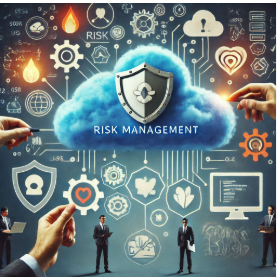In today’s rapidly evolving regulatory environment, organizations face mounting pressure to establish robust governance frameworks, mitigate risks, and ensure compliance with an ever-expanding array of regulations. Governance, Risk and Compliance (GRC) consultants are emerging as indispensable partners in this journey, providing expert guidance to navigate complex challenges and secure long-term success.
Introduction
In a world where regulatory scrutiny is intensifying, the role of Governance, Risk and Compliance consultants has never been more critical. These professionals help organizations develop and implement effective strategies to manage risk, ensure regulatory compliance, and establish strong governance frameworks. This blog post explores the role of GRC consultants, the benefits they offer, and how to select the right partner for your business needs.
Understanding Governance, Risk, and Compliance (GRC)
At its core, GRC represents an integrated approach to aligning IT and business objectives while managing risk and meeting compliance obligations.
- Governance: Involves the frameworks, policies, and procedures that ensure an organization is directed and controlled in a way that achieves its objectives.
- Risk: Focuses on identifying, assessing, and mitigating risks that could potentially impact an organization’s operational and financial performance.
- Compliance: Ensures adherence to relevant laws, regulations, and internal policies, minimizing legal and reputational risks.
The Role of GRC Consultants
GRC consultants serve as strategic advisors who assist businesses in navigating the complexities of modern regulatory environments. Their core responsibilities include:
- Risk Assessment and Management: Evaluating potential risks across operations and devising mitigation strategies tailored to your business.
- Policy and Procedure Development: Crafting robust governance frameworks and compliance policies that align with industry standards and regulatory requirements.
- Regulatory Guidance: Providing expert advice on current and emerging regulations, ensuring that your organization stays ahead of compliance challenges.
- Training and Awareness: Educating staff on compliance best practices and risk management techniques, fostering a culture of accountability and continuous improvement.
Key Benefits of Engaging GRC Consultants
Engaging a GRC consultant can deliver substantial benefits, such as:
- Enhanced Operational Resilience: By identifying vulnerabilities early, consultants help safeguard your organization against potential disruptions.
- Improved Regulatory Compliance: Expert guidance ensures that all aspects of your business meet the latest legal and regulatory standards.
- Cost Efficiency: Proactive risk management can significantly reduce the financial impact of regulatory breaches and operational failures.
- Strategic Advantage: A well-implemented GRC framework not only protects your organization but also enhances your reputation, opening doors to new business opportunities.
- Expert Insights: GRC consultants bring industry-specific knowledge and proven methodologies, helping you implement best practices and innovative solutions.
How to Choose the Right GRC Consultant
Selecting the right consultant is crucial to the success of your governance, risk, and compliance initiatives. Consider the following criteria:
- Industry Expertise: Look for consultants with a proven track record in your specific sector, as they will be more familiar with industry nuances and regulatory challenges.
- Comprehensive Service Offering: Ensure the consultant provides end-to-end solutions—from risk assessments and policy development to training and ongoing support.
- Proven Methodologies: Evaluate the consultant’s approach to risk management and compliance to ensure it aligns with best practices and industry standards.
- Client Testimonials and Case Studies: Request examples of past successes and speak with previous clients to gauge the consultant’s effectiveness.
- Cultural Fit: A consultant who understands your organizational culture and values can more seamlessly integrate into your existing framework and drive meaningful change.
Challenges and Solutions in Governance, Risk, and Compliance
Organizations often face challenges such as rapidly changing regulations, siloed information systems, and resistance to change within the corporate culture. GRC consultants address these challenges by:
- Implementing Integrated Systems: Streamlining processes and ensuring all departments communicate effectively.
- Adapting to Regulatory Changes: Providing timely updates and revisions to policies in line with new regulations.
- Driving Cultural Change: Promoting a proactive approach to risk and compliance through continuous training and leadership engagement.
Future Trends in GRC
As technology continues to reshape the business landscape, GRC practices are also evolving. Key trends include:
- Increased Use of Automation: Leveraging AI and machine learning to enhance risk detection and streamline compliance processes.
- Data-Driven Decision Making: Utilizing analytics to predict potential risks and inform strategic decisions.
- Greater Focus on Cybersecurity: Integrating cybersecurity into the broader GRC framework to address emerging digital threats.
- Sustainability and ESG Considerations: Expanding the scope of governance and risk management to include environmental, social, and governance (ESG) factors.
Governance, Risk, and Compliance consultants are essential allies in today’s complex regulatory environment. By leveraging their expertise, organizations can build robust frameworks that not only mitigate risks but also create a strategic advantage in the marketplace. Whether you are a large enterprise or a growing business, engaging a GRC consultant can pave the way for enhanced operational resilience, improved compliance, and sustainable success.
Embrace the support of expert GRC consultants to navigate the challenges of governance, risk, and compliance—ensuring your organization remains agile, resilient, and well-prepared for the future.




